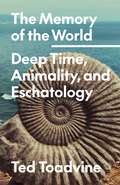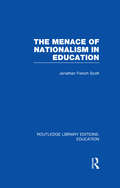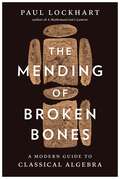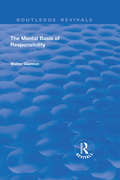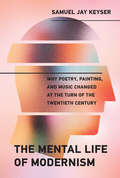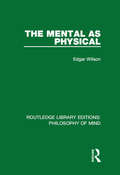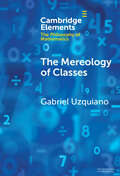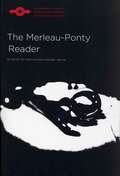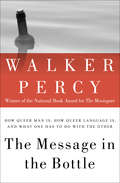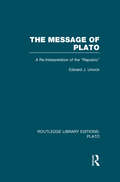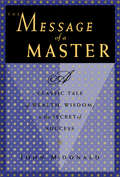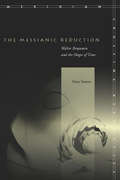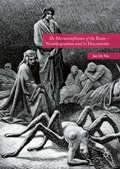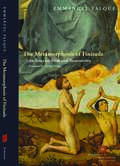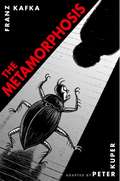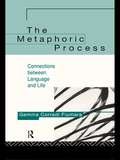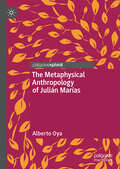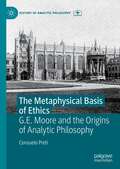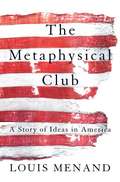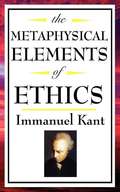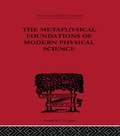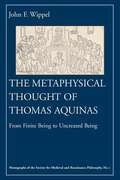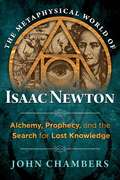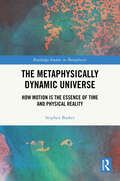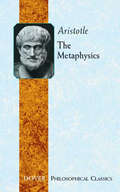- Table View
- List View
The Memory of the World: Deep Time, Animality, and Eschatology (Posthumanities #70)
by Ted ToadvineAdvancing a phenomenological approach to deep time Our imagination today is dominated by the end of the world, from sci-fi and climate fiction to actual predictions of biodiversity collapse, climate disruption, and the emergence of the Anthropocene. This obsession with the world&’s precarity, The Memory of the World contends, relies on a flawed understanding of time that neglects the past and present with the goal of managing the future. Not only does this mislead sustainability efforts, it diminishes our encounters with the world and with human and nonhuman others. Here, Ted Toadvine takes a phenomenological approach to deep time to show how our apocalyptic imagination forgets the sublime and uncanny dimensions of the geological past and far future. Guided by original readings of Maurice Merleau-Ponty, Emmanuel Levinas, Jacques Derrida, Jean-Luc Nancy, and others, he suggests that reconciling our embodied lives with the memory of the earth transforms our relationship with materiality, other forms of life, and the unprecedented future. Integrating insights from phenomenology, deconstruction, critical animal studies, and new materialism, The Memory of the World argues for a new philosophy of time that takes seriously the multiple, pleated, and entangled temporal events spanning cosmic, geological, evolutionary, and human durations.
The Menace of Nationalism in Education (Routledge Library Editions: Education)
by Jonathan Scott FrenchWritten between the two World Wars this volume examines education from the American, British, French & German perspectives and the degree to which the portrayal of those countries in school textbooks contributes to nationalism or world peace.
The Mending of Broken Bones: A Modern Guide to Classical Algebra
by Paul LockhartA joyful and intimate celebration of the beauty and creativity of algebra from one of the foremost math educators of our time.For many of us, algebra conjures up memories of dull classes spent wondering when we’d ever have to solve a system of equations or factor a polynomial. Indeed, most of the time, if we need to plan a budget or figure out how early to leave the house for work, common sense or a quick, seat-of-the-pants approximation is good enough.But as mathematician Paul Lockhart argues in The Mending of Broken Bones, once we stop thinking of algebra in terms of its practical applications, we can appreciate it for the beautiful and gratifying subject that it is. In his hands, algebra is the delicate craft of untangling numerical puzzles to reveal the hidden patterns and often surprising behaviors of the numbers themselves. As Lockhart traverses numerical systems, slips into and out of higher-dimensional space, and delights in the intimate connections between algebra and geometry, we come to see the discipline from his viewpoint: not as the mundane exercises of our school years, but instead as an art form whose beauty lies in its elegant simplicity.Written in Lockhart’s charming and conversational prose, The Mending of Broken Bones is an impassioned and deeply personal celebration of algebra that helps us experience the profound joys of mathematical discovery.
The Mental Basis of Responsibility (Routledge Revivals)
by Walter GlannonThis title was first published in 2002: This book is an analysis of the ways in which mental states ground attributions of responsibility to persons. Particular features of the book include: attention to the agent’s epistemic capacity for beliefs about the foreseeable consequences of actions and omissions; attention to the essential role of emotions in prudential and moral reasoning; a conception of personal identity that can justify holding persons responsible at later times for actions performed at earlier times; an emphasis on neurobiology as the science that should inform our thinking about free will and responsibility; and the melding of literature on free will and responsibility in contemporary analytic philosophy with legal cases, abnormal psychology, neurology and psychiatry, which offers a richer texture to the general debate on the relevant issues.
The Mental Life of Modernism: Why Poetry, Painting, and Music Changed at the Turn of the Twentieth Century
by Samuel Jay KeyserAn argument that Modernism is a cognitive phenomenon rather than a cultural one.At the beginning of the twentieth century, poetry, music, and painting all underwent a sea change. Poetry abandoned rhyme and meter; music ceased to be tonally centered; and painting no longer aimed at faithful representation. These artistic developments have been attributed to cultural factors ranging from the Industrial Revolution and the technical innovation of photography to Freudian psychoanalysis. In this book, Samuel Jay Keyser argues that the stylistic innovations of Western modernism reflect not a cultural shift but a cognitive one. Behind modernism is the same cognitive phenomenon that led to the scientific revolution of the seventeenth century: the brain coming up against its natural limitations. Keyser argues that the transformation in poetry, music, and painting (the so-called sister arts) is the result of the abandonment of a natural aesthetic based on a set of rules shared between artist and audience, and that this is virtually the same cognitive shift that occurred when scientists abandoned the mechanical philosophy of the Galilean revolution. The cultural explanations for Modernism may still be relevant, but they are epiphenomenal rather than causal. Artists felt that traditional forms of art had been exhausted, and they began to resort to private formats—Easter eggs with hidden and often inaccessible meaning. Keyser proposes that when artists discarded their natural rule-governed aesthetic, it marked a cognitive shift; general intelligence took over from hardwired proclivity. Artists used a different part of the brain to create, and audiences were forced to play catch up.
The Mental as Physical (Routledge Library Editions: Philosophy of Mind)
by Edgar WilsonThe central theme of this impressively argued study is that the mental and physical are identical. Drawing heavily on recent scientific research into the mind-brain relationship, Dr Wilson argues that human mentality, rationality and purposefulness are phenomena which come within the compass of scientifically based explanation. The consequences of this thesis are enormous both in relation to the controversies about reasons and causes as explanations of human behaviour, and, more important, to the problems of free will, moral responsibility, penal philosophy, ethics and the law. The book argues that free will is a misconceived idea and that our notions of moral responsibility need radical revision. The book is of considerable relevance not only to academic philosophy but also to scientists and jurisprudents interested in the implications of this study. Originally published in 1979.
The Mereology of Classes (Elements in the Philosophy of Mathematics)
by Gabriel UzquianoThis Element is a systematic study of the question of whether classes are composed of further parts. Mereology is the theory of the relation of part to whole, and we will ask how that relation applies to classes. One reason the issue has received attention in the literature is the hope that a clear picture of the mereology of classes may provide further insights into the foundations of set theory. We will consider two main perspectives on the mereology of classes on which classes are indeed composed of further parts. They, however, disagree as to the identity of those parts. Each perspective admits more than one implementation, and one of the purposes of this work is to explain what is at stake with each choice.
The Merleau-Ponty Reader (Studies In Phenomenology and Existential Philosophy)
by Leonard Lawlor Ted ToadvineThe first reader to offer a comprehensive view of Maurice Merleau-Ponty’s (1908-1961) work, this selection collects in one volume the foundational essays necessary for understanding the core of this critical twentieth-century philosopher’s thought. <p><p> Arranged chronologically, the essays are grouped in three sections corresponding to the major periods of Merleau-Ponty’s work: First, the years prior to his appointment to the Sorbonne in 1949, the early, existentialist period during which he wrote important works on the phenomenology of perception and the primacy of perception; second, the years of his work as professor of child psychology and pedagogy at the Sorbonne, a period especially concerned with language; and finally, his years as chair of modern philosophy at the Collège de France, a time devoted to the articulation of a new ontology and philosophy of nature. The editors, who provide an interpretive introduction, also include previously unpublished working notes found in Merleau-Ponty’s papers after his death. Translations of all selections have been updated and several appear here in English for the first time. <p><p> By contextualizing Merleau-Ponty’s writings on the philosophy of art and politics within the overall development of his thought, this volume allows readers to see both the breadth of his contribution to twentieth-century philosophy and the convergence of the various strands of his reflection.
The Message in the Bottle: How Queer Man Is, How Queer Language Is, and What One Has to Do with the Other
by Walker PercyFrom the National Book Award–winning author of The Moviegoer: &“These essays . . . have a way of quickening the spirit and cleansing the sight&” (The New Republic). Before winning the National Book Award for fiction in 1962, Walker Percy was an established scholar of science, philosophy, and language. Presented here are his strongest essays in those subjects, offering what he called a &“theory of man for a new age.&” Ambitious yet readable, The Message in the Bottle encapsulates the philosophical foundations of his groundbreaking novels, perfect for Percy fans and new readers alike. From discussions on the dislocation of man in the twentieth century to theories on why humans talk while other animals do not, thisis an enlightening collection from one of the South&’s most celebrated writers.
The Message of Plato: A Re-Interpretation of the Republic (Routledge Library Editions: Plato)
by Edward J UrwickEdward Urwick’s original work draws upon Plato’s best known work, the Republic, to provide a new interpretation of Plato’s teaching based upon Indian religious thought. Most scholars have sought to interpret the Republic from the standpoint of politics, ethics, and metaphysics and indeed the accepted title of the dialogue – Concerning a Polity or Republic – would seem to legitimate this. Even the alternative title for the work – Concerning Justice – seems to justify such an approach. Yet the original Greek work, Dikaiosune, had a fuller meaning: righteousness. The author believes this gives a truer clue to the meaning of the dialogue. It is a discussion of righteousness in all its forms, from the just dealing of the law-abiding citizen to the spirit of holiness in the saint.
The Message of a Master
by John McdonaldThe Message of a Master is the story of a seemingly miraculous change that takes place in a man after he meets a true master of life. He learns, and shares with us, teachings that allow him to develop his powers so that he can accomplish anything he desires.
The Messianic Reduction: Walter Benjamin and the Shape of Time
by Peter FenvesThe Messianic Reduction is a groundbreaking study of Walter Benjamin's thought. Fenves places Benjamin's early writings in the context of contemporaneous philosophy, with particular attention to the work of Bergson, Cohen, Husserl, Frege, and Heidegger. By concentrating on a neglected dimension of Benjamin's friendship with Gershom Scholem, who was a student of mathematics before he became a scholar of Jewish mysticism, Fenves shows how mathematical research informs Benjamin's reflections on the problem of historical time. In order to capture the character of Benjamin's "entrance" into the phenomenological school, the book includes a thorough analysis of two early texts he wrote under the title of "The Rainbow," translated here for the first time. In its final chapters, the book works out Benjamin's deep and abiding engagement with Kantian critique, including Benjamin's discovery of the political counterpart to the categorical imperative in the idea of "pure violence."
The Metamorphoses of the Brain - Neurologisation and its Discontents
by Jan De VosWhat are we exactly, when we are said to be our brain? This question leads Jan De Vos to examine the different metamorphoses of the brain: the educated brain, the material brain, the iconographic brain, the sexual brain, the celebrated brain and, finally, the political brain. This first, protracted and sustained argument on neurologisation, which lays bare its lineage with psychologisation, should be taken seriously by psychologists, educationalists, sociologists, students of cultural studies, policy makers and, above all, neuroscientists themselves.
The Metamorphosis of Finitude: An Essay on Birth and Resurrection (Perspectives in Continental Philosophy)
by Emmanuel FalqueThis book starts off from a philosophical premise: nobody can be in the world unless they are born into the world. It examines this premise in the light of the theological belief that birth serves, or ought to serve, as a model for understanding what resurrection could signify for us today. After all, the modern Christian needs to find some way of understanding resurrection, and the dogma of the resurrection of the body is vacuous unless we can relate it philosophically to our own world of experience. Nicodemus first posed the question "How can anyone be born after having grown old?Can one enter a second time into the mother's womb and be born?" This book reads that problem in the context of contemporary philosophy (particularly the thought of Husserl, Heidegger, Sartre, Merleau-Ponty, and Deleuze). A phenomenology of the body born "from below" is seen as a paradigm for a theology of spiritual rebirth, and for rebirth of the body from "on high." The Resurrection changes everything in Christianity—but it is also our own bodies that must be transformed in resurrection, as Christ is transfigured. And the way in which I hope to be resurrected bodily in God, in the future, depends upon the way in which I live bodily today.
The Metamorphosis: New Edition - The Metamorphosis By Franz Kafka
by Franz Kafka Peter KuperA brilliant, darkly comic reimagining of Kafka's classic tale of family, alienation, and a giant bug. <P><P>Acclaimed graphic artist Peter Kuper presents a kinetic illustrated adaptation of Franz Kafka's The Metamorphosis. Kuper's electric drawings--where American cartooning meets German expressionism--bring Kafka's prose to vivid life, reviving the original story's humor and poignancy in a way that will surprise and delight readers of Kafka and graphic novels alike. <P><P><i>Advisory: Bookshare has learned that this book offers only partial accessibility. We have kept it in the collection because it is useful for some of our members. Benetech is actively working on projects to improve accessibility issues such as these.</i>
The Metaphoric Process: Connections Between Language and Life
by Gemma Corradi FiumaraMetaphor is much more than just a linguistic phenomena, argues Gemma Corradi Fiumara, it is in fact the key process by which we construct and develop our ability to understand the world and the people we share it with. Rationality as understood by philosophers has led to a disembodied view of ourselves in which interaction between life and language has been downplayed. By looking at the metaphoric process - in an interpersonal rather than a formal way - its importance in allowing us access to new worlds of experience is revealed. The metaphoric potential in us all exposes us to the world and initiates our involvement in it.
The Metaphysical Anthropology of Julián Marías (Palgrave Frontiers in Philosophy of Religion)
by Alberto OyaThis book provides a detailed account of Julián Marías’s metaphysical anthropology with the ultimate aim of offering a coherent and systematic analysis of Marías’s argumentation for claiming that the conscious hope for Christian salvation through resurrection — and with it the hope that Jesus Christ did actually resurrect, and more generally the hope that Christian revelation is true — is justified not because the certainty or the likelihood that this salvation will, as a matter of fact, actually occur, but because this hope amounts to a self-affirming exercise, a conscious endorsement of human reality, and as such a sign of authenticity.
The Metaphysical Basis of Ethics: G.E. Moore and the Origins of Analytic Philosophy (History of Analytic Philosophy)
by Consuelo PretiThis book remedies the absence in the history of analytic philosophy of a detailed examination of G. E. Moore’s philosophical views as they developed between 1894 and 1902. This period saw the inauguration of analytic philosophy through the work of Moore and Bertrand Russell. Moore’s early views are examined in detail through unpublished archival material, including surviving letters, diaries, notes of lectures attended, papers for Cambridge societies, and drafts of early work, in order to revise the established view that the origin of analytic philosophy at Cambridge was an abrupt split from F. H. Bradley’s Absolute Idealism. Traditional accounts of this period have highlighted the anti-psychologism of Frege’s logic but have not explored the impact of this movement more broadly. Anti-psychologism was a key feature of the work of Moore’s teachers on the nature of the mind and its objects, in their interpretation of Kant, and in ethics. Moore’s teachers G.F. Stout and James Ward were significant contributors to the late 19th century debates in mental science and the developing new science of psychology. Henry Sidgwick’s criticisms of Kant and Bradley and his leading work in ethics were key influences on Moore. Moore’s Trinity Fellowship Dissertations are essential historical evidence of the development of Moore's new theory of judgment, a theory whose defining role in the origins of analytic philosophy cannot be overstated. Moore’s study of Kant in his dissertations ultimately formed the groundwork for his Principia Ethica (1903), which evolved from ideas that manifested in Moore’s earliest Apostles’ papers, developed through his dissertations, and were refined through his Elements of Ethics lectures (1898-99). This monumental work of early twentieth century ethics is thus shown to be the culmination of Moore’s early philosophical development.
The Metaphysical Club: A Story of Ideas in America
by Louis MenandWinner of the 2002 Pulitzer Prize for History, a riveting, original book about the creation of modern American thought. The Metaphysical Club was an informal group that met in Cambridge, Massachusetts, in 1872, to talk about ideas. Its members included Oliver Wendell Holmes, Jr., future associate justice of the United States Supreme Court; William James, the father of modern American psychology; and Charles Sanders Peirce, logician, scientist, and the founder of semiotics. The Club was probably in existence for about nine months. No records were kept. The one thing we know that came out of it was an idea -- an idea about ideas.
The Metaphysical Elements of Ethics
by Immanual KantIf there exists on any subject a philosophy (that is, a system of rational knowledge based on concepts), then there must also be for this philosophy a system of pure rational concepts, independent of any condition of intuition; in other words, a metaphysic. It may be asked whether metaphysical elements are required also for every practical philosophy, which is the doctrine of duties, and therefore also for Ethics.
The Metaphysical Foundations of Modern Physical Science: A Historical and Critical Essay (International Library of Philosophy)
by Edwin Arthur BurttFirst published in 2000. Routledge is an imprint of Taylor & Francis, an informa company.
The Metaphysical Thought of Thomas Aquinas
by John F. WippelThis volume offers a presentation of Aquinas's metaphysical thought. It is based upon an examination of his texts organized according to the philosophical order as he himself described it, rather than according to the theological order.
The Metaphysical World of Isaac Newton: Alchemy, Prophecy, and the Search for Lost Knowledge
by John ChambersNewton’s heretical yet equation-incisive writings on theology, spirituality, alchemy, and prophecy, written in secret alongside his Principia Mathematica • Shows how Newton’s brilliance extended far beyond math and science into alchemy, spirituality, prophecy, and the search for lost continents such as Atlantis • Explains how he was seeking to rediscover the one true religion that existed prior to the Flood of Noah, when science and spirituality were one • Examines Newton’s alternate timeline of prehistory and his study of prophecy through the Book of Revelations, including his prediction of Apocalypse in the year 2060 Isaac Newton (1643-1727) is still regarded by the world as the greatest scientist who ever lived. He invented calculus, discovered the binomial theorem, explained the rainbow, built the first reflecting telescope, and explained the force of gravity. In his famous masterpiece, Principia Mathematica, he described the mechanics of the physical universe with unimagined precision, proving the cosmos was put together according to laws. The perfection of these laws implied a perfect legislator. To Newton, they were proof that God existed. At the same time Newton was writing Principia Mathematica, he was writing a twin volume that he might have called, had it been completed, Principia Theologia--Principles of Theology. This other masterpiece of Newton, kept secret because of the heresies it contained, consists of thousands of essays providing equation-incisive answers to the spiritual questions that have plagued mankind through the ages. Examining Newton’s secret writings, John Chambers shows how his brilliance extended into alchemy, spirituality, the search for lost continents such as Atlantis, and a quest to uncover the “corrupted texts” that were rife in the Bibles of his time. Although he was a devout Christian, Newton’s work on the Bible was focused not on restoring the original Jewish and Christian texts but on rediscovering the one true religion that existed prior to the Flood of Noah, when science and spirituality were one. The author shows that a single thread runs through Newton’s metaphysical explorations: He is attempting to chart the descent of man’s soul from perfection to the present day. The author also examines Newton’s alternate timeline of ancient history and his study of prophecy through the Book of Revelations, including his prediction of an Apocalypse in the year 2060 followed by a radically transformed world. He shows that Newton’s great hope was that these writings would provide a moral compass for humanity as it embarked upon the great enterprise that became our technological world.
The Metaphysically Dynamic Universe: How Motion is the Essence of Time and Physical Reality (Routledge Studies in Metaphysics)
by Stephen BarkerThis book develops a new metaphysical framework in which time is motion through a higher dimension. In other words, time literally flows. It breaks through the long debate about time flow and temporal experience in metaphysics by offering an entirely new approach that reconciles psychological time with the time of science. Our experience of change and our own being in time reveals a relentless motion or passage. Time really appears to flow. This apparent time motion is a profound enigma for currently well-known conceptions of time. This book develops a new theory of time that renders temporal passage fully intelligible. It treats time motion seriously by building in motion as a metaphysically fundamental feature of the physical universe, whose principal form is through higher-dimensional space. This motion-first metaphysics rejects the orthodox view that motion is explained in terms of space and time; rather, it uses space and motion to define time. Furthermore, it solves puzzles of time, change, and persistence, and is consistent with special relativity. The Metaphysically Dynamic Universe will appeal to researchers and graduate students interested in philosophy of time, metaphysics, and philosophy of physics.
The Metaphysics
by Aristotle"All men by nature are actuated with the desire of knowledge," declared Aristotle. The philosopher's works are foundational to the history of science, and his treatise on metaphysics, or "first philosophy," is divided into sections on previous philosophical thought and theories; a refutation of skepticism; a demonstration of God's existence; an examination of the relation of metaphysics to the other sciences; an elucidation of the nature of the infinite; and other major philosophical issues.The central theme consists of an inquiry into how substance may be defined as a category of being. Aristotle defines substance as ultimate reality, since substance belongs to no other category of being, and because substance serves as the basis for every other category of being. The philosopher also defines substance as an underlying reality, or as the substratum of all existing things. He describes substance as both formal and material reality, and he discusses the relation between potentiality and actuality. An excellent example of Aristotle's dialectical method, which reasons from reliable opinions rather than known truths, this work offers a fine introduction to classical metaphysics.
